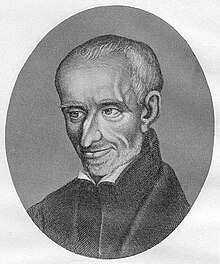Denis Pétau

Denis Pétau (21 August 1583 – 11 December 1652), also known as Dionysius Petavius, was a French
Life
Pétau was born in
After spending two years at Bourges he returned to Paris, and began a correspondence with
Works


Continuing the chronological labours of Joseph Justus Scaliger, Pétau published in 1627 an Opus de doctrina temporum, which has been often reprinted. An abridgment of this work, Rationarium temporum, was translated into French and English, and has been brought down to the year 1849.[2]
The complete list of his works fills twenty-five columns in
Among his previous writings, Pétau had inserted some masterly dissertations on chronology; in 1627 he brought out his De doctrina temporum, and later the Tabulae chronologicae (1628, 1629, 1633, 1657). It surpassed Scaliger's De Emendatione temporum (Paris, 1583), and prepared the ground for the works of the Benedictines. A summary of it appeared in 1633 (1635, 1641, etc.) under the title of Rationarium temporum, of which numerous reprints and translations into French, English, and Italian have been made.[1]
About the same time he wrote poetical works in Greek and in Latin and dissertations (often of a polemical nature) against
Petau's claim to fame chiefly rests on his vast, but unfinished, De theologicis dogmatibus, the first systematic attempt ever made to treat the development of
The reputation Pétau enjoyed during his lifetime was especially due to his work on chronology. He boasted that he counted eight thousand mistakes in the
In his
The work furnished a copious supply of documents. Pétau exaggerates the faults of Scholasticism; but he defends it against the accusations of Erasmus. In the Dogmata, after giving the history of each dogma, he adds the refutation of new errors.[1]
In his polemical writings his style was bitter; he was more gentle in discussions with Grotius. The memory of Pétau was celebrated the day after his death by Henri Valois, one of his pupils, and by Leo Allatius in a Greek poem composed at the request of Pope Urban VIII.[1]
Legacy
A crater on the Moon is named Petavius in his honour.
Works
- Dionysius Petavius, Opus de Doctrina Temporum, 1627
- Dionysius Petavius, The History of the World or an Account of Time, 1659
- Denis Petau. Antonii Kerkoetii Aremorici Animadversorum liber. Ad Claudii Salmasii notas in Tertullianum de Pallio, ristampa anastatica dell'edizione 1622 a c. di A. CAPONE, Clioedu, Lecce 2010.
References
- ^ a b c d e f g h i
 One or more of the preceding sentences incorporates text from a publication now in the public domain: Herbermann, Charles, ed. (1913). "Denis Pétau". Catholic Encyclopedia. New York: Robert Appleton Company.
One or more of the preceding sentences incorporates text from a publication now in the public domain: Herbermann, Charles, ed. (1913). "Denis Pétau". Catholic Encyclopedia. New York: Robert Appleton Company.
- ^ a b c One or more of the preceding sentences incorporates text from a publication now in the public domain: Chisholm, Hugh, ed. (1911). "Petau, Denys". Encyclopædia Britannica. Vol. 21 (11th ed.). Cambridge University Press. p. 285.
